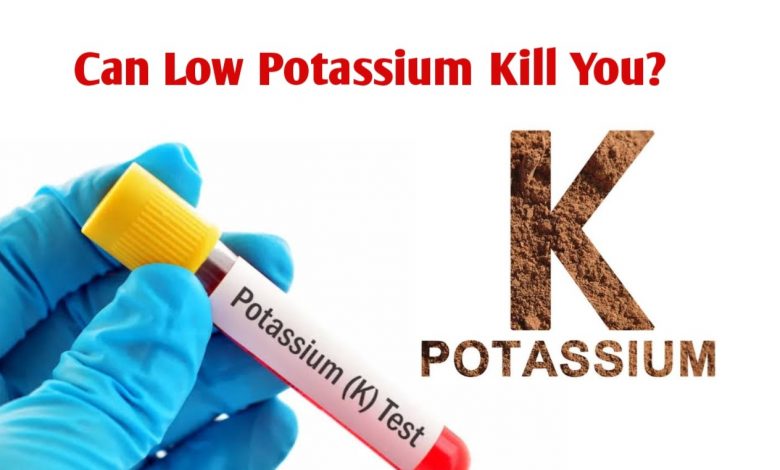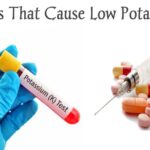Can You Die From Low Potassium?

What is potassium?
Potassium is an important mineral that your body needs to work properly. It is a type of electrolyte. It helps your nerves function and muscles contract. It helps your heartbeat stay regular. It also helps move nutrients into cells and waste products out of cells.
Many years ago, when humans roamed the earth gathering and hunting, potassium was abundant in the diet, while sodium was scarce. The so-called Paleolithic diet delivered about 16 times more potassium than sodium. Today, most Americans get barely half of the recommended amount of potassium in their diets.
The average American diet contains about twice as much sodium as potassium, because of the preponderance of salt hidden in processed or prepared foods, not to mention the dearth of potassium in those foods. This imbalance, which is at odds with how humans evolved, is thought to be a major contributor to high blood pressure, which affects one in three American adults.
What does it mean to have low potassium?
Low blood potassium levels also known as hypokalemia are generally defined as a serum potassium level of less than 3.5 mEq/L (3.5 mmol/L). Moderate hypokalemia is a serum level of 2.5-3.0 mEq/L, and severe hypokalemia is a level of less than 2.5 mEq/L.
The table below shows specific recommendations for different age groups.
| Age | Male | Female |
| 0–6 months | 400 mg/day | 400 mg/day |
| 7–12 months | 860 mg/day | 860 mg/day |
| 1–3 years | 2,000 mg/day | 2,000 mg/day |
| 4–8 years | 2,300 mg/day | 2,300 mg/day |
| 9–13 years | 2,500 mg/day | 2,300 mg/day |
| 14–18 years | 3,000 mg/day | 2,300 mg/day |
| 19+ years | 3,400 mg/day | 2,600 mg/day |
The adequate intake during pregnancy is 2,900 mg, and it is 2,800 mg while breastfeeding or chestfeeding.
What causes low blood potassium levels?
According to WebMD, there are several reasons you could have low potassium levels. It may be because too much potassium is leaving through your digestive tract. It’s usually a symptom of another problem. Most commonly, you get hypokalemia when:
• You have diarrhea
• You take medication that makes you pee (water pills or diuretics)
• You vomit a lot
• Your kidneys or adrenal glands don’t work well
It’s possible, but rare, to get hypokalemia from having too little potassium in your diet. Other things sometimes cause it, too, like:
• Certain antibiotics
• Certain types of tobacco
• Diabetic ketoacidosis (high levels of acids called ketones in your blood)
• Drinking too much alcohol
• Folic acid deficiency
• Laxatives that are taken over a long period of time
• Low magnesium
• Some asthma medications
• Sweating a lot
Several syndromes can be associated with low potassium, such as:
• Bartter syndrome
• Cushing’s syndrome
• Fanconi syndrome
• Gitelman syndrome
• Liddle syndrome
Women tend to get hypokalemia more often than men.
Signs and symptoms
Most patients with low potassium levels are often asymptomatic, particularly those with mild or moderate hypokalemia. Symptoms that are present are often from the underlying cause of low potassium levels rather than the hypokalemia itself. The symptoms of low potassium levels are nonspecific and predominantly are related to muscular or cardiac function. Complaints may include the following:
• Weakness and fatigue (most common)
• Muscle cramps and pain (severe cases)
• Worsening diabetes control or polyuria
• Palpitations
• Psychological symptoms (eg, psychosis, delirium, hallucinations, depression)
Can you die from low blood potassium?
Yes, low blood potassium can kill you if left untreated because a low potassium level can make muscles feel weak, cramp, twitch, or even become paralyzed, and abnormal heart rhythms may develop.
Low blood potassium is also associated with an increased risk of arrhythmia in patients with cardiovascular disease, as well as increased all-cause mortality, cardiovascular mortality, and heart failure mortality by up to 10-fold.
How is low blood potassium treated?
The main goal in the management of low blood potassium levels is to prevent or treat life-threatening complications, replace the potassium deficit, and diagnose and correct the underlying cause. Therapeutic urgency depends on the severity of the condition, the existence of comorbid conditions, and the rate of decline of serum potassium levels.
Many doctors prescribe potassium supplements to replace potassium losses and prevent potassium deficiency. Slow-K is a prescription medicine used for prophylaxis and to treat the symptoms of low potassium levels. Slow-K may be used alone or with other medications. Never take potassium supplements without a doctor’s prescription, as this can easily cause high blood potassium levels that are dangerous.
People with low blood potassium levels are advised to eat more potassium-rich food, especially fruits and vegetables such as:
• Avocado
• Bananas
• Beans, lentils
• Beet greens
• Cantaloupe
• Cashews, almonds
• Chicken
• Coconut water
• Dairy and plant milk (soy, almond)
• Dried fruits (raisins, apricots)
• Oranges, orange juice
• Potatoes
• Salmon
• Spinach, broccoli
• Tomatoes
• Winter squash (acorn, butternut)
• Yogurt
However, they need to pay attention to the potassium content of salt substitutes, since it can be high.
How long does it take to recover from low potassium?
Generally, people with low blood potassium levels receiving treatment require an average of 5 days for their serum potassium levels to return to normal. Most patients need a daily potassium supplement of 40 to 80 mEq for 8 days to maintain normal levels.
Patients are strongly advised to follow the recommendations of their doctors or healthcare professionals.





